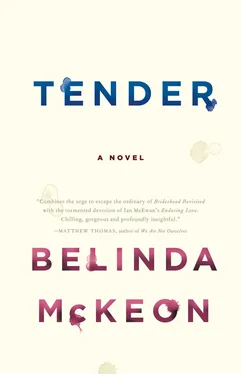All right; that was not what this was. There were moments, that night, that next day, when Catherine looked up to see that Peggy was staring at her, on her face an expression that was not very far from blame. They were in trouble, she and James. They were in so much trouble. Being in trouble in this way made Catherine wary of moving; wary, even, of meeting anyone’s eye. James’s father was confused by the quiet and the caution, she knew; James’s father did not know what James’s mother now knew. He kept trying to joke with them, to draw them both out, and he kept giving up, flashing curious looks in Peggy’s direction, going outside to the farm, where things could be managed, where reactions could be trusted to be what he expected them to be. He thought that they were miserable, all of them, over James’s imminent departure, Catherine thought — and he was right about that, actually, because if there was one thing that she dreaded more than heading back to the house out of which she had walked the evening before, it was not having James to phone up and James to visit; it was the thought of James being a thousand miles away, in a city and a country to which she had never been, not that it would have made a damn bit of difference if she had been there. He would be gone, and she would be here, and that was what she was facing into, and the thought of it made her breath feel as though it was going to refuse to come. But that was not the thing to think about now, she knew; that was not the important thing. The important thing was James. The important thing was to be with James, now. On his bedroom walls, it struck her, there were no posters — they were, in that respect, so different from her bedroom walls at home, still covered with the school years collage of pictures from Just Seventeen and NME . His walls were covered with wallpaper, a pattern of ivy, or something else rising and green. Catherine sat propped against one side of the wall, and James sat propped against the other, and they sat there waiting for the hours to pass, James seeming absorbed in Mrs. Dalloway, Catherine having tried and given up on Orlando . Outside, it was sunny, but outside was not a matter for them. Catherine lay down now, feeling the urge to sink into sleep, and James shifted in his seating, so that his legs were still draped across her, the weight of them pinning her just above her knees. Soon, it would be dinnertime, and they would have to go up to the kitchen, to the table, where James’s mother would smile and sigh across the table, at once pretending that nothing was the matter and making very clear that something was, and James’s father would try to get everyone laughing, and James would be monosyllabic and sarcastic, and Catherine would end up overcompensating, and chattering, and thus betraying him, the way she had done at breakfast, the way she had done at lunch. What was she meant to do, stay quiet and hurt and angry also? They could not both be that way.
But sleep; all she wanted was sleep. She felt so tired. She felt, for a moment, a longing to go home, to run home, but she could not do that either, and even the thought of it struck panic inside her like a match. Ellen’s face; her mother’s face; her father’s face — she pushed them away. Tomorrow was the day for leaving. Tomorrow was the day for home.
“Are you asleep?” James said, nudging her with his leg.
“No,” Catherine said, the word all in a drowse.
“Don’t go to sleep,” he said, and she heard him turn a page.
Moonfoam and Silver (1998)
Half of each can was a curving block of red, the familiar font of the brand name swooping over it, and at the bottom, in yellow-piped block capitals, the word SOUP.
ONION MADE WITH BEEF STOCK sounded vile. PEPPER POT; what, even, was pepper pot soup? And barley was some kind of crop, wasn’t it? A crop grown in places where the land was good enough to hold it.
These were the actual soup cans; that was the thing to understand. That gold circular canvas over there was an actual Marilyn, and in another room were the actual Jackie O paintings, the canvases washed over with an eerie blue. And somewhere else in the gallery was the actual Mao, smug and bleary and bloated. Or, one of the actuals, actually. One of the Maos, six of the Jackies, one of the Marilyns, her lipstick glossy even in monochrome, her beauty spot like a sharp bud of dirt in the paint. Not the actual. That was the point. That was the—
“Let me guess, Citóg,” said a voice from behind her. “You’re mulling over the layers of irony. You’re thinking of how they’re themselves and yet at the same time not themselves. You’re thinking, what am I looking at, actually? What am I—”
“Why am I looking at you, Moran, is the question?” Catherine said, turning to face him. “What are you doing here?”
“On a date,” he shrugged. “What do you think of this stuff?”
“I think he was at his best in the mid-sixties, really, wasn’t he?” she said evenly.
“Oh, no doubt,” Conor said. “Sixty-five to sixty-six, I’d say, to be even more precise about it.”
“Pretty downhill after that.”
“Mmm,” Conor said, nodding vigorously, and together, they drifted on to the huge silkscreen of the dollar sign.
In truth, Catherine didn’t have a clue when Andy Warhol had been at his best, but the mid-sixties seemed a likely possibility, and it seemed like the kind of thing that would be said about Warhol; so she had put it out there, as she often did now, and as often happened now, it had worked. She had got away with it. She was still not quite able to believe that this happened, but it did. You said something, sounding confident as you said it, keeping your voice level, and people nodded, and people agreed with you, and people looked at you as a person who apparently knew their stuff. That was it. It was so easy.
This was what she had discovered this year at college: that when you gave the world the impression that you were up to it, ready for whatever it wanted to throw at you, the stuff the world threw at you turned out to be not that big of a deal after all. It turned out, actually, to be kind of comically manageable. Essays. Reading lists. Meetings with her lecturers. Writing articles for Trinity News; she was doing loads for the books pages of TN now, and getting on nicely. Also, boys, there had been lots of boys, once she had copped herself on and stopped mooning over Conor, who was just a mate now, and actually not a bad one; one among many. This was one of the things of which she was proudest about this second year at college: that she had so many friends now. Maybe too many. Or maybe they were acquaintances, rather than friends, but she didn’t think about the distinction. She just liked it. She liked the way that it was no longer possible, when she walked through Front Arch in the morning, on the way to her class or to the library, to get to where she was going without bumping into at least a couple of people she knew, and maybe more, depending on the time of day; sometimes, if she was not in a rush, not on her way to a lecture or a tutorial, it could take her a full hour to get where she was going, such was the volume of people she would bump into, such were the chats to be had. It gave her a buzz, the feeling that her days were teeming, that there were never enough hours to talk to all the people she wanted to talk to, let alone for all the books she wanted to read, all the poems she wanted to write, all the things she wanted to know about, and talk about, and add to her store.
“Anyway,” she said now, joining up with Conor again. “Who’s the lucky lady?”
“Alice from Modern Theatre,” he said. “Great girl.”
Читать дальше












